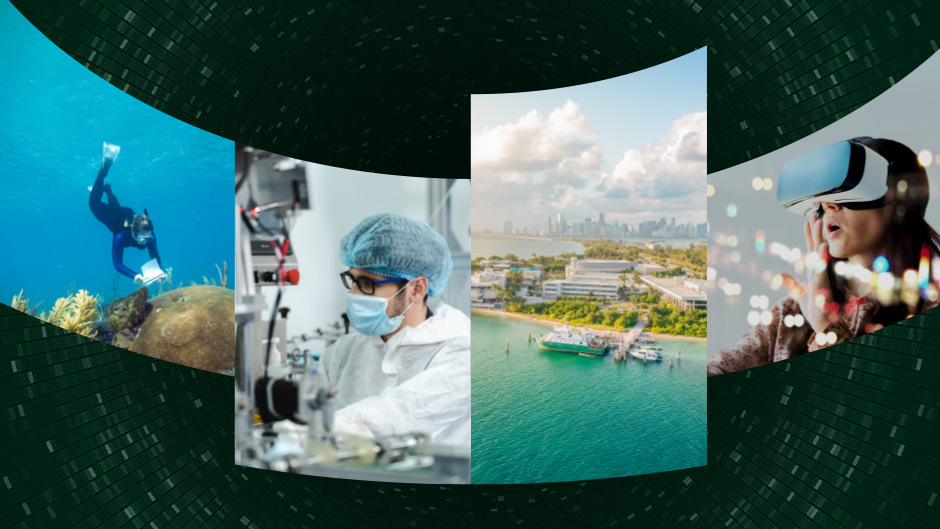From deploying unique hybrid reefs offshore to protect coastlines from storm surge and sea level rise to creating a new accelerated, interdisciplinary degree that prepares students for vocations of the future—including jobs that don’t yet exist—University of Miami students, scientists, and scholars are solving challenges with energy, ingenuity, and resilience. Here is a glimpse into some of that groundbreaking work.
Unique hybrid reefs deployed off Miami Beach
A team of researchers and scientists from the University of Miami developed and deployed 18-foot-long honeycomb-shaped tubes to help restore damaged coral reefs and protect coastal environments. Read more.
Student honored for addressing key health disparity
Joy Jackson, a biomedical engineering student in the College of Engineering, designed a patent-pending electrode holder for electroencephalogram readings that promotes better adherence between the scalp and the electrode for people with Afro-textured hair. Read more.
Firefighter occupation elevated to highest classification for cancer risk
With guidance from a team of scientists, including public health researchers at Sylvester Comprehensive Cancer Center, the World Health Organization’s cancer division reclassified firefighting as a Group 1 carcinogenic profession. The new designation could pave the way for more regulations and funding to protect firefighters. Read more.
Historian one of nine in the world to win Dan David Prize
Krista Goff, an associate professor of history in the College of Arts and Sciences, is a 2023 recipient of the prestigious Dan David Prize for her historical research, particularly her contributions to illuminating the history of minorities in Caucasus. In 2021 she published her award-winning book, “Nested Nationalism: Making and Unmaking Nations in the Soviet Caucasus,” which examines belonging in the Soviet republics. Read more.
Program to revolutionize the undergraduate experience
The University of Miami’s newest undergraduate degree— Innovation, Technology, and Design—is an accelerated, interdisciplinary program that prepares students for a variety of careers—and positions that don’t yet exist—by teaching them skills in entrepreneurship, design thinking, computing, engineering, communication, and ethics, to name a few. Students in the program can graduate in three full years and must complete several design challenges, along with two summer internships and a capstone project. Read more.
Scientists harness machine learning in prostate cancer imaging
Researchers at the Desai Sethi Urology Institute are pioneering ways to harness machine learning for the diagnosis and prognosis of prostate cancer, using magnetic resonance imaging. Their integration of machine learning with diagnostic tools has the potential to improve the timely detection of prostate cancer, which is the most common cancer among men. Read more.
Grant to help further study into drug development for Lewy body dementia
Through a three-year, $21 million grant from the National Institute on Aging, researchers at the Comprehensive Center for Brain Health are launching a Phase 2b study of the neuroprotective agent neflamapimod for Lewy Body dementia. The drug holds potential as a medication if given early enough in the course of the neurodegenerative condition. Read more.

